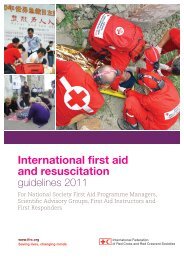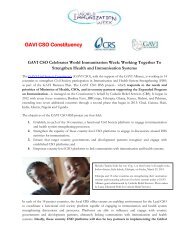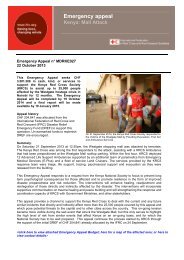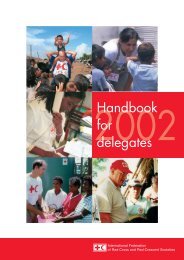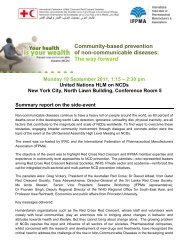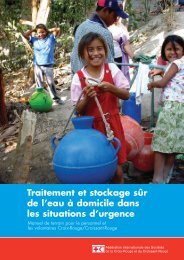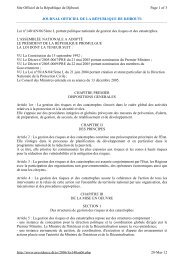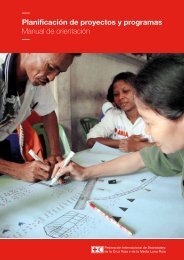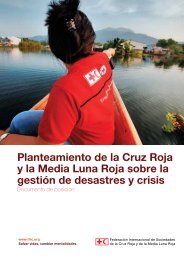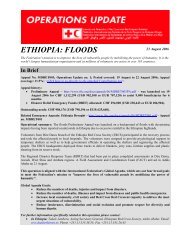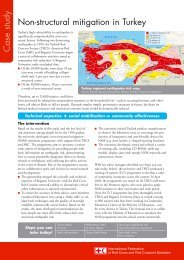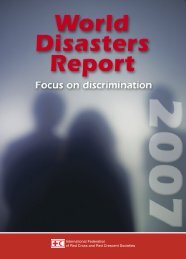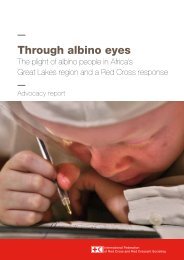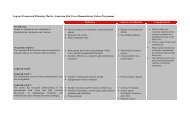World Disasters Report 2010 - International Federation of Red Cross ...
World Disasters Report 2010 - International Federation of Red Cross ...
World Disasters Report 2010 - International Federation of Red Cross ...
Create successful ePaper yourself
Turn your PDF publications into a flip-book with our unique Google optimized e-Paper software.
CHAPTER 7<br />
146<br />
reduction systems that were multi-sectoral and inter-institutional. In each country,<br />
a national commission for risk management and disaster prevention was set up. For<br />
instance, in Nicaragua, the Sistema Nacional para la Prevención, Mitigación y Atención<br />
de Desastres (national system for disaster prevention, mitigation and response,<br />
now known as SINAPRED) was created in 2000 to work with local governments<br />
to strengthen the country’s institutional capacity for disaster preparedness and management,<br />
integrating disaster mitigation and risk reduction into local development<br />
processes. Local governments are responsible for activities related to prevention,<br />
mitigation, preparation, response, rehabilitation and reconstruction within their<br />
territories, based on risk assessments. Several municipalities have incorporated<br />
preventive planning especially in regard to approving building licences and land<br />
use, and different sectors including health, education and planning share disaster<br />
risk information. The system operates with a national disaster fund. Most <strong>of</strong> these<br />
national systems are, however, relatively new and need time to consolidate. Another<br />
concern is that local governments may be allocated responsibilities for which they<br />
lack the capacity and resources.<br />
Addressing the limits in disaster risk reduction<br />
by municipal and city governments<br />
While local government engagement is essential for disaster risk reduction, many<br />
disaster risks need coordinated action across a range <strong>of</strong> local governments. For instance,<br />
many large cities are composed <strong>of</strong> different municipalities (local governments) and disaster<br />
risks are <strong>of</strong>ten concentrated in particular municipalities. For example, São Paulo<br />
is made up <strong>of</strong> a central city with about 11 million inhabitants and 38 separate municipalities,<br />
while Buenos Aires consists <strong>of</strong> a central city <strong>of</strong> some 3 million inhabitants and<br />
26 municipalities. The municipalities with the highest disaster risks are <strong>of</strong>ten among<br />
the weakest financially and have the largest concentrations <strong>of</strong> low-income groups living<br />
in informal settlements. They therefore have the largest deficits in provision for the<br />
infrastructure and services that underpin risk reduction.<br />
Most flood problems in urban areas require a river basin management approach but for<br />
large cities, this can require investments and coordination among many different local<br />
government units – <strong>of</strong>ten including local governments controlled by opposing political<br />
parties. Or extreme weather events can simply overwhelm the capacity <strong>of</strong> a local<br />
government or require actions outside its boundaries and competence.<br />
In December 2009, several small and medium-sized cities in Argentina, including<br />
Salto, Pergamino, Arrecifes, Carmen de Areco and San Antonio de Areco, were flooded<br />
after torrential rains led to local rivers overflowing their banks. San Antonio de Areco,<br />
a town <strong>of</strong> more than 21,000 inhabitants, was hit particularly hard and 3,000 people<br />
had to be evacuated. The city government could not address the causes <strong>of</strong> the flooding.<br />
In part this was linked to rainfall in the whole region being greater than normal,



